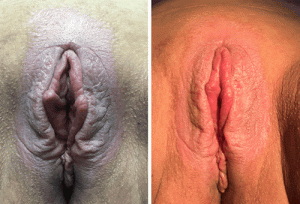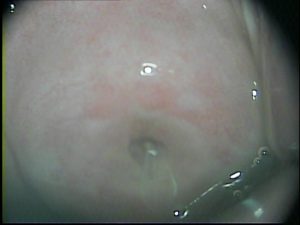Flow, discharge or vaginal Vaginal discharge are synonyms for the same event: production, loss, or release of fluid by female external genitalia. The correct medical term is vaginal Vaginal discharge. In pregnancy the term "leakage by external genitalia" reserves for rupture of the amniotic membrane (water bag)
Vaginal discharge does not necessarily represent a pathological situation (the majority of the women speak of "flow" when its secretion is abnormal) and most of the time is a normal vaginal condition since it is a body which by its characteristics physiological must remain moist continuously and despite its moisture to keep certain conditions that prevent the emergence of atypical infections.
Many women prefer the term "vaginal moisture" to refer to the normal vaginal discharge, since there is some pejorative association with the term flow.
Secretions, and vaginal lubrication
Vaginal secretions come primarily from the cervix (approximately 80-90%) and to a lesser extent the paraurethral glands of Skene and the vulvovestibulares of Bartholino (see vulvar Anatomy); the vagina has no glands but gets wet by filtering liquid from their deeper layers, this explains why the vagina still wet after surgically removing the cervix and glands of Bartholino. The vagina becomes wet waking up in the morning, with sexual stimulation during intercourse.
Vaginal secretions contain water, mucus, fat (by the lobby vulvovaginal sebeceas glands), cells cervicovaginal, white blood cells, antibodies and bacteria (lactobacillus acidophilus) in harmonious balance to preserve the integrity of the organ. This explains why use Vaginal Douches is harmful to the vagina.
Color: it is variable depending on the phase of the menstrual cycle, oral contraceptives or other hormones, medication, sexual activity, type of intimate clothing, etc. but in general it should be transparent and White Pearl homogeneous (such as milk). Intense or green yellow is not normal and logically, nor is the color red.
Consistency: variable, very delicate (as occurs during ovulation) and liquid to thick and sticky (postovulatory phase, use of mini-pill and pregnancy).
Smell: it is "sui generis", that is, to what is supposed it should smell something specific. Urine, for example has a urine smell and smells like that. Vaginal discharge has its own smell which is described as "raw meat" or a slight underarm scent. The smell is exacerbated during sexual stimulation by secretion of glands. There seems to be no racial differences in the female genital odor but there must surely be them because of diet, body weight. physical activity and the type and material of intimate apparel.
There are more humid than others, women number: Judging by the subjective report of some of them, but this is not scientifically provable. The truth is that every woman knows is thus same and when they reported increased vaginal discharge quantity it is possible that this symptom requires to be taken into account, especially if you have characteristics that suggest a vaginal infection.
Anomalous flow
As a rule I follow these simple paradigms:
- Vaginal discharge, even of pungent odor is not necessarily abnormal.
- Not all vaginal flows require treatment.
- If it has no odor but it generates itching and genital irritation the most likely cause is a fungus, genital Candidiasis.
- If you have to "fish" smell but does not generate itch or genital irritation the most likely cause is a Bacterial Vaginosis, a native vaginal flora imbalance.
- If it has a "fishy" odor and produces itching and genital irritation, the most likely cause is a trichomoniasis, a vaginal infection caused by Trichomonas Vaginalis, a sexually transmitted agent considered parasite.
Anomalous flows

Bacterial vaginosis: sparkling white flow little irritant but characteristically foul with certain smell "fishy" that the patient can be recognized.

Genital candidiasis with severe vulvar irritation associated with the use of sanitary towels daily.
-

- Colonias en infección leve
-

- Colonias en infección severa
The fungus colonies lining the surface of the cervix, and part of the vaginal walls in severe cases.
Prevention
- Avoid prolonged and excessive moisture in the area.
- Avoid the chronic use of towels daily protection.
- Avoid the use of synthetic fabrics underwear, use cotton.
- Avoid the use of Vaginal Douches and intimate soaps.
- Avoid broad-spectrum antibiotics by self-medication.
- If you visit swimming pools or beaches do not stay wet swimsuits for long periods of time.
- Sex in the shower or in a body of water (pool, sea) generates a strong vaginal wash that removes the normal vaginal flora making it prone to infections by fungi or bacterial vaginosis.
Genital lubrication

Detail of the cervical mucus normal, transparent, fluid.
I recommend you visit Vaginal discharge, a portal devoted exclusively to vaginal discharge and that exposes a different view about this frequent topic of intimate discussion among women.